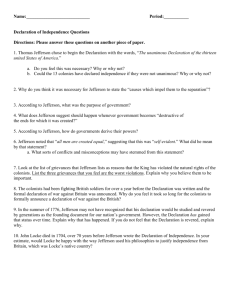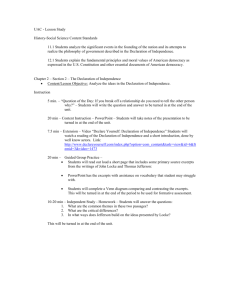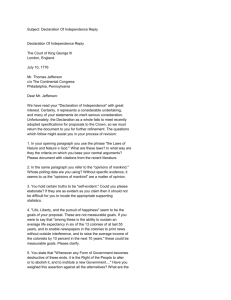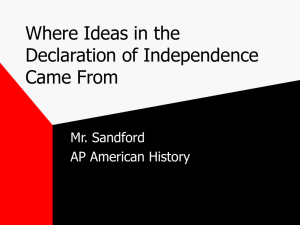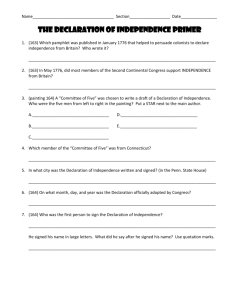Declaration of Independence Question Sheet
advertisement
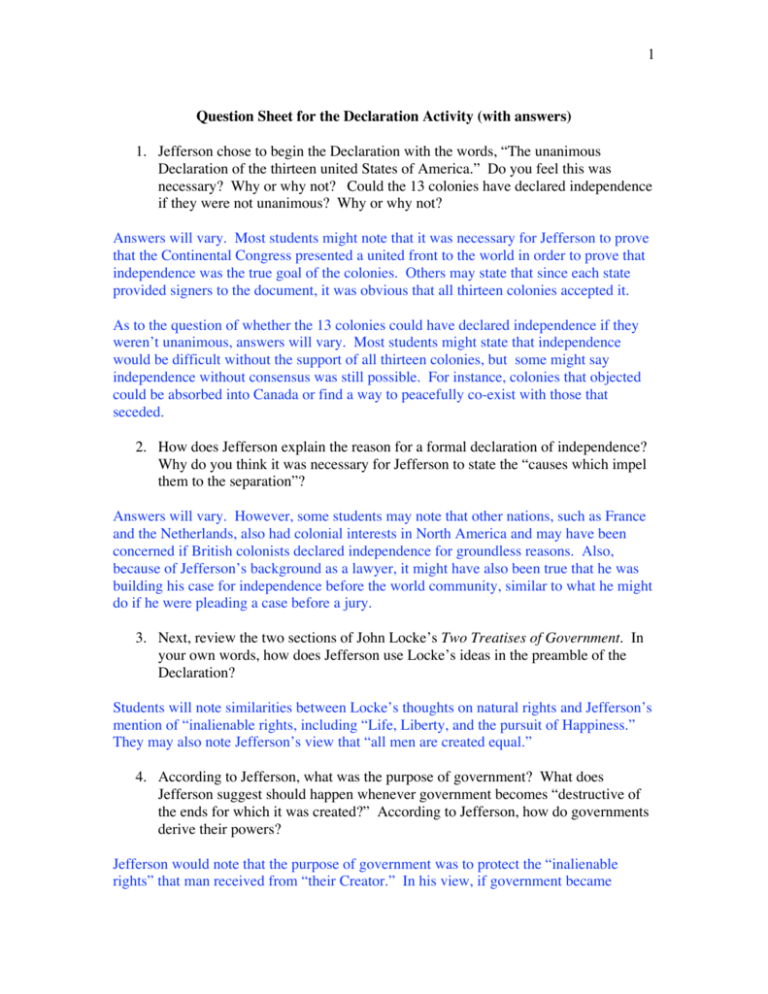
1 Question Sheet for the Declaration Activity (with answers) 1. Jefferson chose to begin the Declaration with the words, “The unanimous Declaration of the thirteen united States of America.” Do you feel this was necessary? Why or why not? Could the 13 colonies have declared independence if they were not unanimous? Why or why not? Answers will vary. Most students might note that it was necessary for Jefferson to prove that the Continental Congress presented a united front to the world in order to prove that independence was the true goal of the colonies. Others may state that since each state provided signers to the document, it was obvious that all thirteen colonies accepted it. As to the question of whether the 13 colonies could have declared independence if they weren’t unanimous, answers will vary. Most students might state that independence would be difficult without the support of all thirteen colonies, but some might say independence without consensus was still possible. For instance, colonies that objected could be absorbed into Canada or find a way to peacefully co-exist with those that seceded. 2. How does Jefferson explain the reason for a formal declaration of independence? Why do you think it was necessary for Jefferson to state the “causes which impel them to the separation”? Answers will vary. However, some students may note that other nations, such as France and the Netherlands, also had colonial interests in North America and may have been concerned if British colonists declared independence for groundless reasons. Also, because of Jefferson’s background as a lawyer, it might have also been true that he was building his case for independence before the world community, similar to what he might do if he were pleading a case before a jury. 3. Next, review the two sections of John Locke’s Two Treatises of Government. In your own words, how does Jefferson use Locke’s ideas in the preamble of the Declaration? Students will note similarities between Locke’s thoughts on natural rights and Jefferson’s mention of “inalienable rights, including “Life, Liberty, and the pursuit of Happiness.” They may also note Jefferson’s view that “all men are created equal.” 4. According to Jefferson, what was the purpose of government? What does Jefferson suggest should happen whenever government becomes “destructive of the ends for which it was created?” According to Jefferson, how do governments derive their powers? Jefferson would note that the purpose of government was to protect the “inalienable rights” that man received from “their Creator.” In his view, if government became 2 “destructive,” it was the right of the citizens to “alter or abolish” that form of government and replace it with a better one. Jefferson believed that governments derived their power “from the consent of the governed.” In other words, the citizens of the nation permitted the government to rule. 5. Jefferson noted that “all men are created equal,” suggesting that this was “selfevident.” Speculate as to what he meant by that statement. What sorts of conflicts and misconceptions may have stemmed from this statement? Answers will vary as to what Jefferson meant by the “all men are created equal” statement. Some students may note that Jefferson made this statement as a slave owner and had no intention of granting citizenship status or equality to his black slaves. Other students might speculate that Jefferson believed in a literal interpretation of this phrase and had no intention of granting equality or the right to vote to women. Also, students may note that some white men (if they were not property owners) did not have the right to vote. 6. Next, look at the list of grievances that Jefferson lists as reasons that the King has violated the natural rights of the colonists. Below, list the three grievances that you feel are the worst violations. Explain why you believe them to be important. Also, note that Jefferson points to King George III in his list of grievances despite the fact that Parliament passed the acts and approved the taxes that led to the colonists calling for independence. The King, on the other hand, was a monarch with limited power. Why would Jefferson blame the King for the problems leading to the Declaration? Explain your view. Answers will vary. Based on their study of the American Revolution and viewing of the series, many students may point to grievances that allowed the British military occupation of colonial cities (for example, the Boston Massacre), imposing taxes without consent (a grievance that is typically mentioned in textbooks), grievances that limit selfgovernment and possibly grievances that caused insurrections of Native Americans. Most students would probably note that it would be easier for the colonists to focus their anger on one individual, King George, than on the Parliament. His likeness was on colonial money, so he was known by all the colonists, while most members of Parliament were not known to the average colonist. Focusing anger and displeasure on one individual could provide a great psychological boost to the independence movement. 7. In the summer of 1776, Jefferson may not have recognized that his declaration would be studied and revered by generations. However, the Declaration has gained that status over time. Write a paragraph that explaining your view of why that has happened. If you do not feel that the Declaration is revered, explain why. Many students who feel that the Declaration is revered will probably note that Jefferson’s statements regarding fundamental rights are representative of our government’s foundation today. In addition, they may also note that the Declaration is displayed in a 3 similar manner (and in a similar location) as the Constitution of the United States and the Bill of Rights, thereby giving it the same status. Other students may note that the document helped unite various factions in the Continental Congress, paving the way for independence. Some students may note that in 21st Century America, the Declaration has no legal “force,” and therefore while it is an important historic document, its importance is significantly overstated. 8. The colonists had been fighting British soldiers for over a year before the Declaration was written and the formal declaration of war against Britain was announced. Why do you feel it took so long for the colonists to formally announce a declaration of war against the British? The length of time between the fighting at Lexington and Concord and the actual declaration of war probably occurred because most colonists (and many delegates to the Continental Congress) hoped for some sort of reconciliation with Britain. They felt that a declaration of war might antagonize the British and make reconciliation difficult, if not impossible. Answers will vary. 9. John Locke died in 1704, over 70 years before Jefferson wrote the Declaration of Independence. In your estimate, would Locke be happy with the way Jefferson used his Two Treatises to justify independence from Britain, which was Locke’s native country? Below, either write a fictitious letter from Locke to Jefferson critiquing his use of Two Treatises in the Declaration of Independence or a fictitious letter from Jefferson to Locke explaining how he adapted Locke’s theory in writing the Declaration. Answers will vary.


